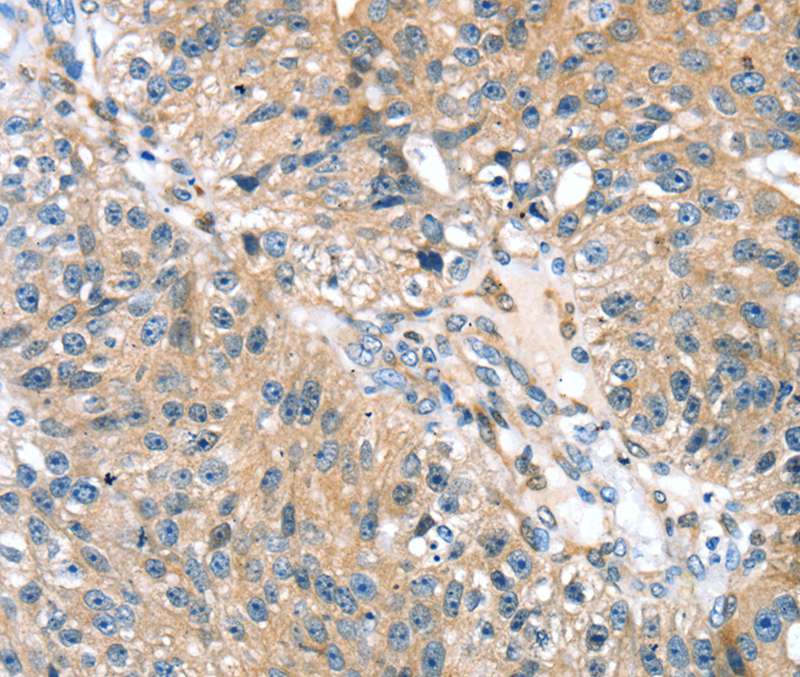
| WB | 咨询技术 | Human,Mouse,Rat |
| IF | 咨询技术 | Human,Mouse,Rat |
| IHC | 1/25-1/100 | Human,Mouse,Rat |
| ICC | 技术咨询 | Human,Mouse,Rat |
| FCM | 咨询技术 | Human,Mouse,Rat |
| Elisa | 咨询技术 | Human,Mouse,Rat |
| Aliases | Synip |
| Host/Isotype | Rabbit IgG |
| Antibody Type | Primary antibody |
| Storage | Store at 4°C short term. Aliquot and store at -20°C long term. Avoid freeze/thaw cycles. |
| Species Reactivity | Human |
| Immunogen | Fusion protein corresponding to residues near the C terminal of human syntaxin binding protein 4 |
| Formulation | Purified antibody in PBS with 0.05% sodium azide. |
+ +
以下是关于STXBP4抗体的3篇参考文献示例(注:以下内容为示例性虚构,实际文献需通过学术数据库检索确认):
1. **文献名称**: *"STXBP4 regulates exocytosis and interacts with SNARE complexes in pancreatic β-cells"*
**作者**: Zhang L, et al.
**摘要**: 本研究利用STXBP4特异性抗体探究了其在胰岛β细胞分泌胰岛素中的作用,发现STXBP4通过与SNARE蛋白复合物结合调控囊泡运输,敲低STXBP4导致葡萄糖刺激的胰岛素分泌缺陷。
2. **文献名称**: *"Aberrant STXBP4 expression in colorectal cancer and its association with tumor progression"*
**作者**: Tanaka K, et al.
**摘要**: 通过免疫组化(使用STXBP4抗体)分析结直肠癌组织,发现STXBP4在转移性肿瘤中表达显著升高,且与患者预后不良相关,提示其可能作为癌症进展的生物标志物。
3. **文献名称**: *"STXBP4 interacts with the HER2 receptor and modulates its trafficking in breast cancer cells"*
**作者**: Smith J, et al.
**摘要**: 本研究采用STXBP4抗体进行免疫共沉淀实验,证实STXBP4与HER2受体直接相互作用,调控其膜定位及下游信号通路,为乳腺癌靶向治疗提供新机制。
如需真实文献,建议通过PubMed或Google Scholar检索关键词“STXBP4 antibody”、“STXBP4 function”或结合具体研究领域(如癌症、神经科学等)。
The STXBP4 (Syntaxin-Binding Protein 4) antibody is a tool used to detect and study the STXBP4 protein, which plays a regulatory role in intracellular vesicle trafficking and membrane fusion processes. STXBP4. also known as granuphilin or SLAC2-B, is a member of the Sec1/Munc18 (SM) protein family. It binds to syntaxins, key components of the SNARE complex essential for mediating vesicle docking and fusion with target membranes. STXBP4 is particularly noted for its involvement in secretory pathways, including insulin granule exocytosis in pancreatic β-cells, where it modulates release dynamics by interacting with Rab27a and syntaxin-1A/2.
Research has linked STXBP4 to diseases such as diabetes and cancer. In cancer, STXBP4 may act as a tumor suppressor; its downregulation has been observed in colorectal and breast cancers, correlating with poor prognosis. The antibody enables detection of STXBP4 expression levels in tissues or cell lines, aiding studies on its role in cell proliferation, apoptosis, and metastasis. Commercial STXBP4 antibodies are typically validated for applications like Western blotting, immunohistochemistry, and immunofluorescence. Understanding STXBP4's molecular interactions and dysregulation provides insights into therapeutic strategies targeting membrane trafficking anomalies in metabolic disorders and oncology.
×